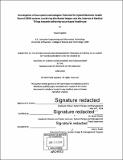Convergence of eco-system technologies : potential for hybrid electronic health record (EHR) systems combining distributed ledgers and the Internet of Medical Things towards delivering value-based Healthcare
Author(s)
Ingabire, Paula
DownloadFull printable version (7.126Mb)
Alternative title
Potential for hybrid EHR systems combining distributed ledgers and the IoMT towards delivering value-based Healthcare
Other Contributors
Massachusetts Institute of Technology. Integrated Design and Management Program.
Advisor
Bryan Moser.
Terms of use
Metadata
Show full item recordAbstract
The Healthcare industry, just like any industry, is constantly racing to stay abreast with pace of technological innovations, especially at such a time where the industry is experiencing a strain on the global healthcare infrastructure. Specifically, the evolution of record management systems in the healthcare system has taken a slow and gradual transformation with each stage of transformation carrying over certain aspects and functions of previous stages. A survey of record management practices reveals that record management begun with paper-based records that have since partially been replaced with centralized Electronic Health Records (EHR). With the advent of Electronic Health Records enabled by distributed ledgers, we continue to see the inclusion of traditional paper-based functions beyond centralized EHR functions. Electronic data sharing in the healthcare ecosystem is constrained by interoperability challenges with different providers choosing to implement systems that respond to increasing their productivity. Prioritizing a patient-focused strategy during implementation of EHRs forces providers to implement systems that are more interoperable. A system engineering approach was adopted to guide the development and valuation of candidate architectures from Stakeholder analysis to concept generation and enumeration. Nine (9) key design decisions were selected with their combinations yielding 512 feasible hybrid architectures. In this paper, we proposed a hybrid EHR solution combining distributed ledger technologies and Internet of Medical Things, which contributes towards providing value-based healthcare. Leveraging properties of distributed ledgers and IoMT, the hybrid solution interconnects various data sources for health records to provide real-time record creation and monitoring whilst enabling data sharing and management in a secure manner.
Description
Thesis: S.M. in Engineering and Management, Massachusetts Institute of Technology, System Design and Management Program, 2018. Cataloged from PDF version of thesis. Includes bibliographical references (pages 64-66).
Date issued
2018Department
Massachusetts Institute of Technology. Engineering and Management Program; Massachusetts Institute of Technology. Integrated Design and Management Program.Publisher
Massachusetts Institute of Technology
Keywords
Engineering and Management Program., Integrated Design and Management Program.